Salesforce Service Cloud Overview
Salesforce Service Cloud Overview
NOTE:
Generally Service agents works on Service Console.
Service Cloud focuses on customer support and case management.
Salesforce Service Cloud is a customer service and support platform built on the Salesforce Customer Success Platform.
Service Cloud enables service teams to manage cases, knowledge, and incidents collaboratively from a single AI-powered workspace. It supports omnichannel customer interactions across email, phone, chat, social media, and self-service portals. Key features include case management, knowledge management, service process automation, omnichannel routing, telephony integration, AI-powered recommendations, and service analytics.
Objects used in Service Cloud
- Case: The key object for managing customer support issues or requests. It stores information about customer inquiries, complaints, or incidents.
- Account: Represents companies or organizations that customers belong to. Acts as a parent record for Contacts and Cases.
- Contact: Individuals related to Accounts. Represents customers or users contacting support.
- Solution (may be less used in Lightning): Stores predefined answers or resolutions to common problems, helping agents quickly resolve cases.
- Service Contract: Defines terms of service agreements customers have, such as SLAs (Service Level Agreements).
- Entitlement: Tracks customer support entitlements and ensures cases are handled within contractual limits.
- Contract: Legal agreements linked to accounts, may affect service delivery.
- Asset: Items or products owned by customers, linked to accounts and cases for issue tracking.
- Work Order: Used for field service and on-site work management.
- Service Appointment: Schedule of appointments related to field service or customer visits.
- Knowledge Article: Stores knowledge base content agents use to solve cases.
- Case Comment: Internal or customer-visible comments on cases.
- Case Feed: An activity feed showing case updates and collaboration.
- Case Contact Role: Defines relationships between cases and contacts, e.g., primary contact on a case.
- Milestone: Represents important steps in the lifecycle of a case, often used with Entitlements.
How Salesforce Makes Your Customers Happy
Offer support everywhere and on any device. Connect with customers where they are — phone, email, SMS text, social media, webchat, web communities, messaging apps like WhatsApp, and more.
Send immediate responses to show that you care. Let customers know that you’ve received their issue by sending them automatic updates and messages.
Auto-escalate important issues before they become emergencies. Add automatic workflows that flag key customers or concerns and forward them to managers by specific dates or times.
How Salesforce Improves Service Agent Productivity
Support all channels from one screen. Everything agents need is right before them so they can focus on customers, not technology.
Route issues to the right person. Instead of guessing who should answer each question from which channel, automatically route all customers to the right agents, every time.
Track key metrics for improvement. view regular snapshots of your team’s average first response times, average customer wait times, total customer interactions, and more.
Turn on the Service Setup Assistant and set up the Lightning Service Console app
The Service Setup Assistant can set up a simple help center or messaging channel, that need Enabling digital experiences and generating free subdomains that can expose your data to external users.
After enabling, quickly secure your data access with the Convert Member Access tool in Setup > Digital Experiences > Settings.
Case
- Support Settings
- Business Hours
- Holidays
Case actions under Feed
- Post
- Log a Call
- Poll
- Close Case
- Add Comment
- Change Status
- Change Owner
Ways to create a case
- Email-to-case (once activated can’t be deactivated)
- On-demand
- keep email traffic outside your network’s firewall and refuse emails larger than 25 MB
- 1,000,000 emails/day
- standard
- keep email traffic inside your network’s firewall and accept emails larger than 25 MB
- Agent downloaded on local machine to turn email into cases
- 2,500 emails/day
- Web-to-case
- 5,000 cases/24hrs
- Unsupported content types: Attachments, Rich text area (RTA) saved as plain text if used, Multipart/form-data, script tags (will be saved as pain text when submitted in web-to-case forms)
- Manual (Directly from salesforce platform, From Experience Cloud)
- Automated (Flow)
- Answer site - escalate unanswered question to case
- Turn emails and social media posts into cases
- Convert customer interactions (phone, chat, messaging)
Main case automation tools
Plan for Case Automation based on questions asked to service team
How Support Settings looks
Support Processes
Case resolution process
Case Assignment Rules
Case Auto Response Rules
Case Escalation Rule
Search Case Escalations
Limits on all rules
Service level agreement (SLA)
Agreement between you and customer
Entitlement management: Group of features which help you enforce the SLA.
Entitlement processes
Entitlement processes use milestones to enforce and automate customer support SLAs in Salesforce, ensuring every case is managed on schedule
Entitlement Processes track SLAs by defining a sequence of time-based steps (milestones) that support agents must complete on cases (like “First Response” or “Resolution Time”) .
Each milestone has a deadline, starting when a case enters the process; actions automate notifications or escalations if milestones are missed .
Agents see milestone countdowns on each case to ensure timely service and SLA compliance .
Milestones and entitlement processes can be customized for different support levels (e.g., platinum/gold/silver) and products .
Salesforce allows up to 10 milestones per entitlement process by default, more on request
Actions on milestone:
Success Actions: What should happen if milestone completed
Warning Actions: Ex: Warn the agents, 1hr before milestone end date time
Violation Actions
ssdsd


















Comments
Post a Comment